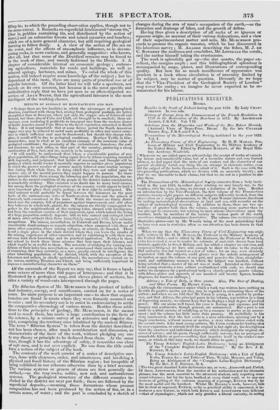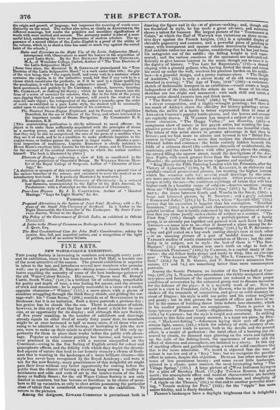PUBLICATIONS RECEIVED.
BOOKS.
Rambles hi the South of Ireland during the year 1838. By Lady CHAT. MERTON. In two vole.
History of Europe front the Cinnmencement of time French Revolution in 1780 to time Restoration of the Bourbons in 1815. By ARCHIBALD ALISON, F.R.S.E. Vol. VII.
Selections front the Hesperides and 1Yorks of the Rev. Robert Herrick, (Antient) Vicar of Dean-Prior, Devon. By the late CHARLES SHORT, Esq., F.R.S. and F. S.A.
Transactions of the Netenroloyieal Society, instituted in the year 1823. Vol. I.
An Elementary Course of Civil Engineering, By D. H. MAHAN, Pro- fessor of Military and'Civil Engineering in the Military Academy of the United States. Edited by Professor BAntow, of the Royal Mili- tary Academy, Woolwich.
[ Whenever we are called upon to acknowledge the receipt of works of exceed- ing labour and considerable value, but of a recondite nature and very- limited. interest, we fed regret that the taste of our readers and the character of our journal absolutely forbid any thing like an attempt at elaborate notice, even did the subject of the books themselves admit of it. Such is the case with the two preceding publications, which we dismiss with an unseemly brevity; not that we are insensible to their claims, but that we arc not in a position to die- play them.
The Transactions of the Meteorological Society emanates from a body insti- tuted in the year 1S23, to collect facts relating-, we may loosely say, to the weather, with the view, in time, to attempt a deduction of its laws. Besides an introduction by the Vice-President, the first volume of the Transactions contains twenty-eight papers on different subjects differently treated, from the obss, ,ation on a single phenomenon, to Mr. CARR WOODS' elaborate directions for making meteorological observations at laud and sea, with remarks on the subject of metcorological research. In addition to these, there are two ap- pendixes of greater hulk than the volume, containing more matter than we can attempt to enumerate, but relating to most minute -observations upon the weather, made by members of the society in various parts of the world, somstimes statistical. sometimes descriptive, The volume also 'nettle! tsyesal illustrative plates—one by Mr. Wooris being of the most painstaking kind. we have ever seen in statistics, often as our attention has been drawn to that subject.
When we say that the Elementary Course of Civil Engineering was origi- nally written by Mr. D. IL MALIAN, the Professor in the Military Academy of the 'United States, and is edited by Mr. Ba.nrsow, the Professor at Woolwich, (who has revised it so as to render its estimate of materials drawn from local districts applicable to Great Britain, and has added a chapter on cast-iron and suspension-bridges,) we have said enough to show its value to the student. But authority was not wanted as a test of value; for no one, even stenderly ftequainted with the subjects, could glance over the orderly arrangement of its matter, or open the volume at any part, and perceive the clear, straightfor- ward, and satisfactory manlier in which the subject was handled, without being satisfied that a master of his art was at work. Intended as this volume
is for young students' ' a race seldom overburdened with cash, we should also notice its cheapness for a professional book—a closely-printed quarto volume, with fifteen plates and upwards of one hundred and twenty figures, besides diagrams, for fourteen shillings.]
Adrian. ; a Tale qf Italy, in three cantos. Also, The Star of Destiny, and Other Poems. By HENRY COOK. [Although the circumstances under which a work was written have nothing to do with its positive merits, yet they may be regarded in estimating those of the author ; and when we are told that Mr. COOK IS young, is a painter by profes- sion, and that Adrian, the principal poem in his volume' was written in a time of depressing anxiety, we cannot deny that he displays ahigh degree of poetical power. His ear seems well tuned, his verse is flowing and vigorous, and his imagery and sentiments, though general, are unborrowcd. But a poet is not made by a fitful exercise of versifying, or by a recourse to poetry as an amuse- ment ; and the volume has little more than promise. So unskilfully is his story constructed, that the last canto is a mere addendum, spinning out by a tragic conclusion, without reason or motive, a story whose action ended with the second canto. Like most young authors, Mr. COOK weakens his leading idea by over-expansion, or extends it till the original is lost sight of; his descriptions want the exactness and individual character which distinguish the original ob- server of nature ; and his poem, though sufficiently nervous, has no passages of remarkable felieity or power—nothing that imprints itself in the reader's me- mory, or which, in this busy week, we should strive to quote.] The Young Scholar's English-Latin Dictionary : being an Abridgment of the " Complete English-Latin Dictionary." By the Rev. J. E. RIDDLE, M.A.
The Young Scholar's Latin-English Dictionary : with a List of Latin Verbs, Tenses, &c. ; and Tables of Time, Weight, Measure, and Value. Being an Abridgment of the " Complete Latin-English Dictionary." By the Rev. J. E. RIDDLE, M.A. [The two great standard Latin dictionaries are, or were, Ainsworth and Enact Of these, AINSWORTH, from the number of his authorities and his idiomatic phrases, was the most essential to the advanced student, only requiring occa- sional reference ; but for the tyro, baulked at every third word, or to any one desirous of getting at the common meaning of a passage, ENTECK was by far the most useful a Nonni :cud the handiest. Whilst Mr. ns work, however, bids fair to rival or supersede ENTICK, so far as practical utility is concerned, it in- troduces a new feature, in which both Elms's: and AINSWORTH were deficient —that of etymologies ; which not only gratifies a liberal curiosity, in noting the origin and growth of language, but impresses the meaning of words more distinctly on the mind. The author also notes, as clearly as AINSWORTH, the different meanings, but marks the primitive and secondary significations of words with more method and success. The accessory matter is also of a more useful kind, embracing the views or discoveries of modern scholars. The ap- pearance of a second edition of thq Latin-English is a proof of the utility of the volume, which in so short a time has made so ranch way against the rooted habit of the schools.] Rules and Exercises on the Right Use of the Latin Subjunctive Mood ; interspersed with Observations to assist the learner in the acquisition of a pure Latin Style. By the Rev. RICHARD BATHURST GREENLAW, M.A., of Worcester College, Oxford, Author of " The True Doctrine of the Latin Subjunctive Mood." Some time since, the Reverend It. B. GREENLAW promulgated his "True
Doctrine of the Latin Subjunctive Mood," in a work under that title ; the gist of the view being, that " the copula itself, and every verb in a sentence which contains the copula, is in the indicative mood, but that if any verb be in a clause which constitutes the predicate, or if it be used in a clause qualifying the predication, it will be found in the subjunctive mood." This opinion has
been questioned, and publicly by Dr. CROMBIE ; without, however, daunting Mr. GREENLAW, or shaking his theory ; which he has here thrown into the form of a series of exercises for scholars, that, like to the fable of the young men digging their land in search of a treasure, will enrich the student if he miss his main object ; for, independent of the author's remarks upon the order of words as exhibited in a pure Latin style, the student will be constantly called upon to analyze the logical structure of his sentences.] The Nautical Steam-Engine Explained, and its Powers and Capabilities Described, for the use of Officers of the Navy, and others interested in the important results of Steam Navigation. By Commander R. S. ROBINSON, R.N.
[This unpretending publication is chiefly addressed to naval officers : its ;abject is to make them sufficiently acquainted with the principles of steam as a moving power, and with the structure of nautical steam-engines, so that they may be able to comprehend the uses of the parts of a machine when they see it at work, and be in a condition to make profitable inquiries in the
engine-room, or further pursue the subject in larger works. Besides a prac- tical inspection of machinery, Captain ROBINSON is chiefly indebted to Woo REID'S excellent little treatise fur the laws of steam, and to TREDOOLD for the account of the nautical steam-engine, to which the author confines himself. The book is illustrated by platei.] Elements of Zoology : embracing a view of Life as manifested in the various gradations of Organized Beings. By WILLIAM. RHINO, Mem- ber of the Royal College of Surgeons, Author of "Elements of Geo- logy," &c.
[A skeleton or synopsis of this extensive subject, embracing a general view of the various branches of the science, and calculated to serve the student as an introductory text-book. It is profusely illustrated by wood-cuts.]
The Simplicity and Intelligible Character of Christianity : in a series of four Sermons, communicatqd to the Editor :of the Bath Journal, by Presbuteros: with a Postscript on the Evidences of Christianity. Poor-Law Rhymes. By J. E. CARPENTER; Author of 6' Minstrel Musings," "Lays for Light Hearts," &c. &c.
P Ammimrs.
Proposed Alterations in the 'System of Joint S!oc't Backing; with a .7)e- fence of the Small Note Currency of &named. In a Letter to the -Right Honourable the Chancellor of the Exchequer. By JOHN Kiln- roan SMITII, Writer to the Signet.
The Policy of the Government of _British India, as exhibited in Official Llocumcr.t2,
A Letter to the Mouse of Commons on Railways in Ireland. By MictuLtr. J. QUIN, Esq.
The Real Constitutional Case for Jain Bull's Consideration; asking for justice, free, full, and impartial justice, and a recognition of the right of petition, and of an answer thereto.



























 Previous page
Previous page